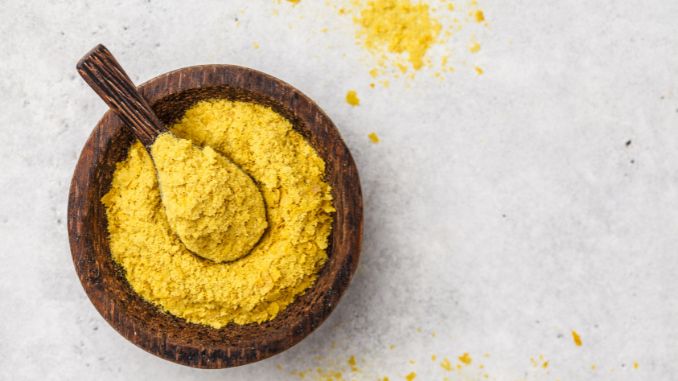Nutritional yeast is a deactivated yeast known for its nutty, cheesy flavor and impressive nutritional profile, offering numerous health benefits.
Unlike baker’s or brewer’s yeast, it’s specifically grown for consumption and is packed with essential nutrients.
I first discovered the nutritional yeast [1] benefits while transitioning to a plant-based diet, and it’s been a game-changer for adding flavor and nutrition to meals.
Moreover, you can add nutritional yeast to a variety of dishes, from vegan sauces to seasoning vegetables, making it a versatile ingredient in cooking.
Notably, its health benefits include being a rich, complete protein source and supporting heart health and immune function.
Types Of Nutritional Yeast
There are two main types:
1. Fortified Nutritional Yeast
Enriched with extra nutrients like B12, often recommended for vegans.
2. Unfortified Nutritional Yeast
Contains only naturally occurring nutrients.
Fortified varieties are great if you’re looking for a vegan alternative with an added nutrient boost, while unfortified is ideal for those wanting a more natural option. Additionally, nutritional yeast flakes are versatile and can be used in cooking to create vegan cheese sauces and enhance dishes like pasta and popcorn.
Nutritional Information
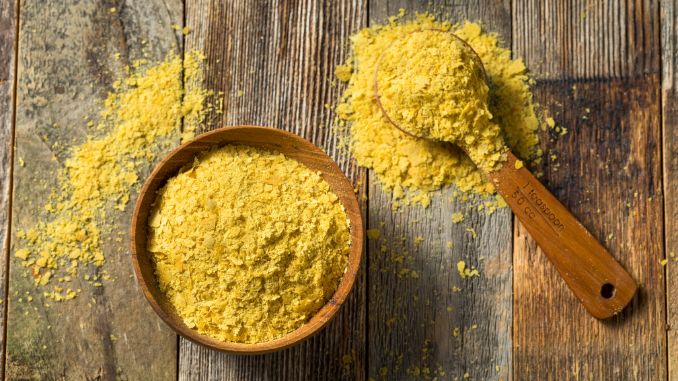
Nutritional yeast is a nutrient-dense food that packs a punch without adding extra fat or calories to your diet. Moreover, a typical serving size of about two tablespoons offers a wealth of nutritional benefits.
Here’s a snapshot of what you get:
- 8 grams of protein: Aiding in muscle repair and growth.
- 2 grams of fiber: Supporting digestive health.
- 2 grams of fat: Mostly healthy fats that are essential for your body.
- 2 grams of carbohydrates: Providing a quick energy boost.
- 10% of the daily value (DV) for vitamin B12: Crucial for nerve function and the production of DNA.
- 20% of the DV for folic acid: Important for cell division and the formation of DNA.
- 10% of the DV for selenium: An antioxidant that helps protect your cells from damage.
Health Benefits Of Nutritional Yeast
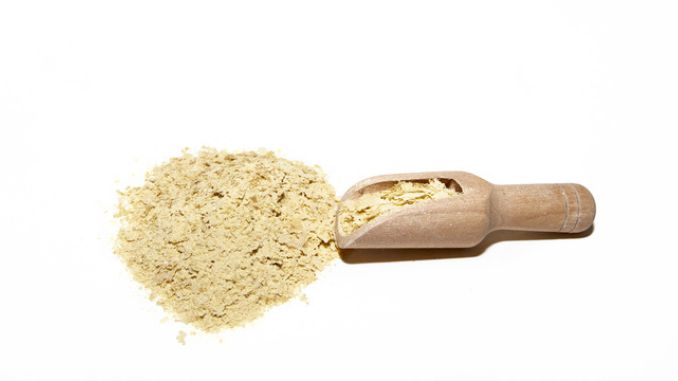
1. Rich In B Vitamins
Fortified nutritional yeast can provide 100% of your daily B12 needs.
2. High In Protein
A small serving contains 8g of protein, supporting muscle repair and growth. Nutritional yeast is a complete protein, containing all nine essential amino acids.
3. Immune Support
Packed with beta-glucans and antioxidants, it may help bolster your immune system.
Moreover, essential amino acids are crucial for bodily functions, making nutritional yeast a valuable plant-based protein source comparable to animal products.
Dr. Eric Berg DC, says that beta-glucans are not only good to help regulate cholesterol but its really good for your immune system and protecting you against viruses and bacteria.
Comparison With Other Types Of Yeast
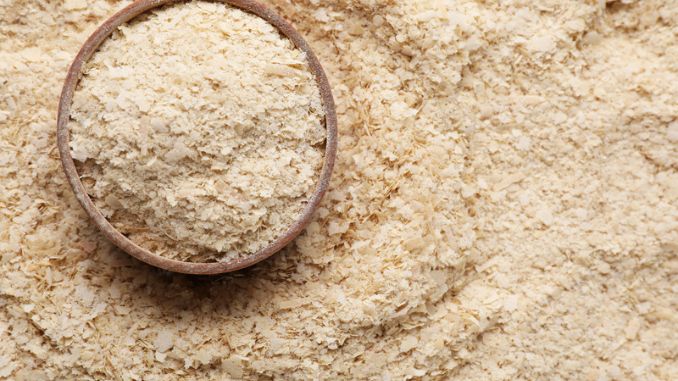
1. Baker’s Yeast
Baker’s Yeast [2] is used for baking; not meant for direct consumption.
2. Brewer’s Yeast
Brewer’s Yeast [3] is a by-product of beer-making; more bitter and less nutrient-dense. Brewer’s yeast is used for fermentation and remains live, whereas nutritional yeast is deactivated and serves as a nutritional supplement, particularly beneficial in plant-based diets.
Nutritional yeast stands out because it’s cultivated specifically for its flavor and nutritional content.
How To Use Nutritional Yeast?
Sprinkle it on popcorn for a cheesy, guilt-free snack.
- Mix it into pasta, soups, or sauces to enhance flavor. Adding nutritional yeast to soups and sauces not only boosts the savory taste but also provides health benefits like high vitamin content.
- Blend it into dressings or dips for a creamy texture.
- My favorite recipe? Without a doubt, a simple cashew “cheese” sauce with nutritional yeast. It’s perfect for nachos or pasta and always a hit with my family.
Choosing The Right Nutritional Yeast
Selecting the right nutritional yeast can make a significant difference in your diet. To begin with, there are two main types to consider: fortified and unfortified.
Fortified nutritional yeast is enriched with additional vitamins and minerals, such as vitamin B12 and folic acid, making it an excellent choice for those looking to boost their nutrient intake.
On the other hand, unfortified nutritional yeast contains only the naturally occurring nutrients found in the yeast cells, offering a more natural option. When shopping, look for products labeled as “vegan” or “gluten-free” to ensure they meet your dietary needs.
Fortified nutritional yeast is generally recommended for its enhanced nutritional profile, especially for those on a vegan diet.
Are There Any Risks?
While generally safe, some people may experience:
- Digestive discomfort if consumed in large amounts.
- Allergic reactions for those sensitive to yeast.
- Health risks for individuals with certain conditions, such as glaucoma or hypertension, who should avoid nutritional yeast.
Conclusion
Nutritional yeast isn’t just a trendy food—in fact, it’s a nutrient powerhouse with endless possibilities. For example, whether you’re sprinkling it on popcorn, enhancing your workouts, or boosting your B12 intake, it’s definitely worth a try.
The potential health benefits of nutritional yeast include supporting immune health, providing essential nutrients like protein and B vitamins, and possibly lowering cholesterol, though more research is needed to fully understand its benefits.
What’s your favorite way to use nutritional yeast? Share your thoughts and let’s swap recipes!
Discover the Anti-Inflammatory Cookbook Bundle, packed with recipes designed to nourish your body, reduce pain, and support a healthier you!
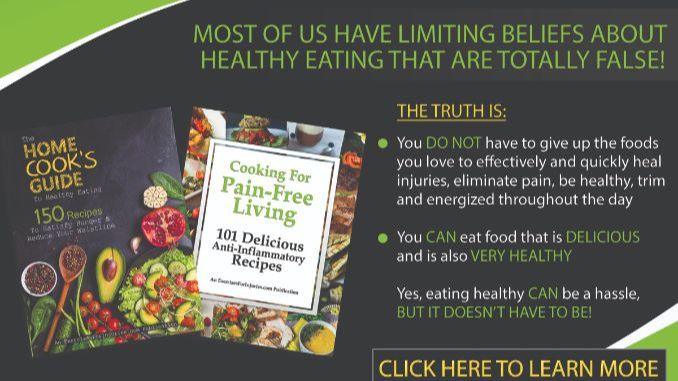
Frequently Asked Questions
What does nutritional yeast do for your body?
Nutritional yeast is rich in B vitamins, protein, and antioxidants, supporting energy production, immune health, and cell repair.
Is it okay to eat nutritional yeast every day?
Yes, in moderation, it’s safe and nutritious for daily consumption unless you have sensitivities or specific health concerns.
Are there negative side effects of nutritional yeast?
Some may experience headaches, digestive upset, or allergic reactions, especially if sensitive to yeast products.
Is nutritional yeast a good probiotic?
No, it’s not a probiotic, but it contains beta-glucans and nutrients that may support gut health.
Is nutritional yeast hard on the liver?
No, it’s generally not harmful to the liver when consumed in moderation.

Rick Kaselj MS, is a leading kinesiologist and injury specialist as well as co-creator of the best-selling Unlock Your Hip Flexors program. Rick creates exercise programs that help people heal injuries and eliminate pain, so they can go back to living a full, active, healthy life.

